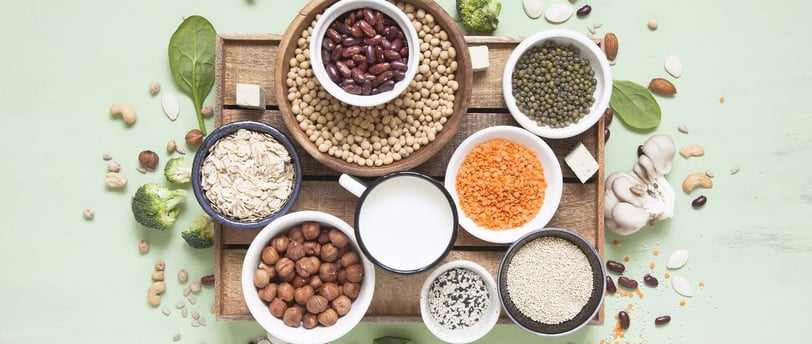PLANT POWER
Exploring Protein Sources for a Stronger, Healthier You!
NUTRITION
Rohit
2/12/20232 min read



In recent years, there has been a surge in interest surrounding plant-based diets, and for good reason. As the world shifts towards more sustainable and health-conscious choices, understanding the rich array of protein sources from plant-based foods becomes paramount. In this blog, we'll delve into various plant-based protein options, explore their protein content, and compare them to traditional animal-based sources. Spoiler alert: the results might just convince you that plant-based protein sources are the way forward for a healthier, more sustainable lifestyle.
1. Legumes and Pulses:
Lentils, chickpeas, black beans, and peas are not only versatile in the kitchen but also pack a protein punch. For instance, a cup of cooked lentils provides about 18 grams of protein, making them an excellent choice for plant-based protein seekers.
2. Quinoa:
Often hailed as a complete protein, quinoa boasts all nine essential amino acids. A cup of cooked quinoa offers around 8 grams of protein, making it a valuable addition to a plant-based diet.
3. Tofu and Tempeh:
Derived from soybeans, tofu and tempeh are protein powerhouses. A 4-ounce serving of tempeh provides approximately 21 grams of protein, while tofu offers around 10 grams per half-cup. These soy-based options are not only rich in protein but also versatile in various culinary applications.
4. Nuts and Seeds:
Almonds, chia seeds, hemp seeds, and pumpkin seeds are stellar sources of plant-based protein. For example, a quarter-cup of almonds delivers around 7 grams of protein, while two tablespoons of chia seeds contribute about 4 grams.
5. Plant-Based Protein Powders:
For those aiming to boost their protein intake, various plant-based protein powders, such as pea, hemp, and brown rice protein, offer convenient options. These powders can be easily incorporated into smoothies, shakes, or baked goods.
Comparing Animal and Plant-Based Proteins:
While animal products like meat and dairy are traditional protein sources, they often come with added saturated fats and cholesterol. Plant-based proteins, on the other hand, tend to be lower in saturated fats and offer additional nutritional benefits like fiber, vitamins, and antioxidants. Moreover, they contribute to reducing the environmental footprint associated with meat production.
Conclusion:
In the grand showdown between animal and plant-based protein sources, the latter emerges as a compelling winner. Not only do plant-based options provide ample protein to support muscle function and overall health, but they also bring a host of additional benefits. Choosing a diet rich in plant-based proteins not only promotes personal well-being but also contributes to a more sustainable and compassionate world. So, next time you're considering your protein sources, why not let the plant kingdom take center stage? Your body and the planet just might thank you :)
Enlightenment in your Inbox
Care@LiveBetter.co +91 98 10 22 57 00


© 2023 Live Better
